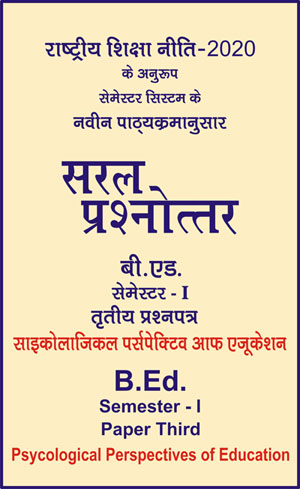|
बी एड - एम एड >> बी.एड. सेमेस्टर-1 प्रश्नपत्र-III - साइकोलाजिकल पर्सपेक्टिव आफ एजूकेशन बी.एड. सेमेस्टर-1 प्रश्नपत्र-III - साइकोलाजिकल पर्सपेक्टिव आफ एजूकेशनसरल प्रश्नोत्तर समूह
|
|
|||||||
बी.एड. सेमेस्टर-1 प्रश्नपत्र-III - साइकोलाजिकल पर्सपेक्टिव आफ एजूकेशन (अंग्रेजी भाषा में)
Chapter 6 - Intelligence and Creativity
Question- What is the Intelligence ? Explain the meaning and nature of Intelligence.
Or
What is the nature of intelligence ?
Or
What is the Meaning of Intelligence.
Or
Write types of intelligence according to Thorndike.
Or
Explain the Nature of Intelligence.
Answer-
Meaning of Intelligence
(1) Woodworth, “Intelligence means intellect put to use. It is the use of intellectual abilities for handling a situation or accomplishing any task.”
(2) Stern, “Intelligence is the ability to adjust oneself to a new situation.”
(3) Ross, “Conscious adaptation to new situation is intelligence.”
(4) Thorndike, “Intelligence is the ability to make profitable use of past experience.”
(5) Veegman, “Intelligence is the capacity to learn and adjust to relatively new and changing conditions.”
(6) Binet, “Intelligence is the capacity to think well, to judge well and to be self-critical.”
(7) Burt, “The capacity to flexible adjustment is intelligence.”
Thorndike drew an important distinction among three broad classes of intellectual functioning. Standard intelligence tests measured only “abstract intelligence”. Also important were “mechanical intelligence - the ability to visualize relationships among objects and understand how the physical world worked.” and social intelligence - the ability to function successfully in interpersonal situations. Thorndike called for instruments to develop measures for these other types of intellect.
Thorndike developed psychological connectionism. He believed that through experience neural bonds or connections were formed between perceived stimuli and emitted responses; therefore, intellect facilitated the formation of the neural bonds. People of higher intellect could form more bonds and form them more easily than people of lower ability. The ability to form bonds was rooted in genetic potential through the genes influence on the structure of the brain, but the content of intellect was a function of experience. Thorndike rejected the idea that a measure of intelligence independent of cultural background was possible. Thorndike proposed that there were four general dimensions of abstract intelligence :
Altitude : the complexity or difficulty of tasks one can perform (most important).
Width : the variety of tasks of a given difficulty.
Area : a function of width and altitude.
Speed : the number of tasks one can complete in a given time.
Nature of Intelligence
The word “intelligence”, forms part of our ordinary stock of words which we use every day. In the field of psychology, too, the word “intelligence” finds a fairly comprehensive use, but it has been defined in a number of ways by the scientist. Some of these definitions are given below :
(1) Intelligence is the Ability of Adjusting in a New Situation :
According to Wells, ‘Intelligence is the property of recombining our behaviour pattern so as to act better in a novel situation.’ In William Stern’s opinion, ‘Intelligence is the ability of adjusting oneself to a new situation.’
These definitions are faulty in the following respects :
- They fail to clarify the full scope of intelligence.
- Intelligence and adjustability are not the same. Intelligence is innate but adjustability is mostly learnt.
(2) Intelligence is the Ability to Avail of Experience : Both Ebbinghaus and Thorndike define intelligence as the ability to make profitable use of past experience. In other words, intelligence is the ability of learning.
This definition has the following effects :
- Learning and intelligence are not identical because learning depends on many factors besides the latter.
- This definition too does not describe the full scope of intelligence.
(3) Intelligence is the Ability of Abstract Thinking : According to Garret, one may define “Intelligence as including the abilities demanded in the solution of problems which require the comprehension and use of symbols.” In Terman’s opinion, “Intelligence is the ability to think abstractly.”
This definition suffers from the following defects :
- Abstract thinking is not intelligence, it is only a part of intelligence.
- This definition fails to describe the complete scope of intelligence.
(4) Intelligence is the Conglomeration of Many Powers : In Wechsler’s opinion, “Intelligence is the aggregate or global capacity of an individual to act purposefully, to think rationally and to deal effectively with his environment.” Computing the different powers of intelligence, Husband has said, “An intelligent person uses past experience effectively, is able to concentrate and keep his attention focussed for longer periods of time, adjusts himself to a new and unaccustomed situation rapidly, with less confusion and with fewer false moves, shows variability and versatility of response, is able to see distant relationship, can carry on abstract thinking, has a greater capacity of inhibition or delay and is capable of exercising self-criticism.”
Actually, Husband has given a very good description of an intelligence person but intelligence cannot be accepted to be the sum total of all these qualities. The psychologists, however, differ in considering intelligence as single ability or a collection of many abilities. A description of the different theories concerning the nature of intelligence will help to understand the various interpretations of the form of intelligence.
|
|||||

 i
i 










